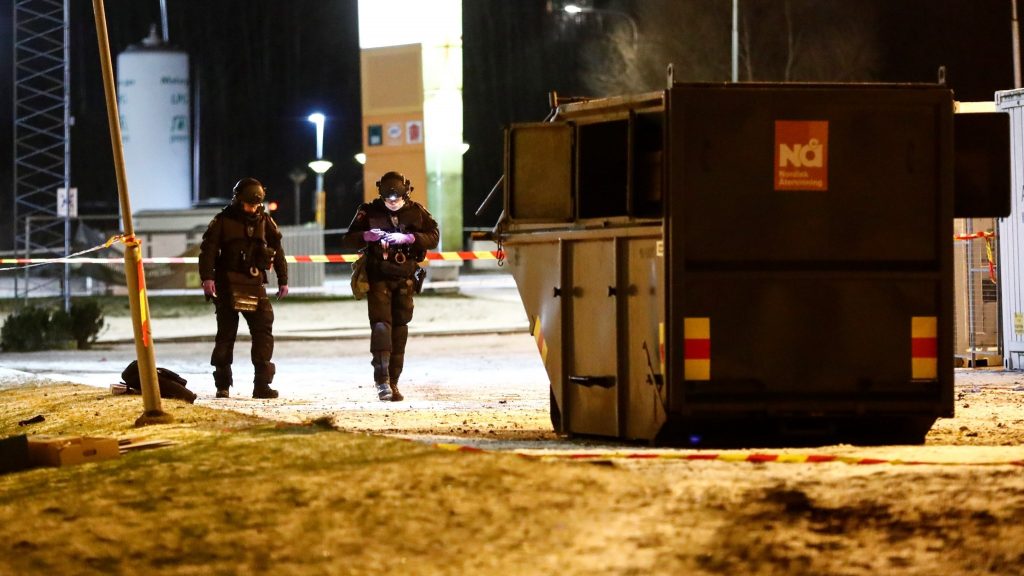
Nobody was convicted for the bombing at Axel Adler’s street. Photo: Thomas Johansson/TT
Relevant to this article is the article "Nazis placed bomb in spite of Swedish Security Service surveillance" from the previous day.
When two Nazis were prosecuted for a bombing against a refugee housing in Gothenburg, the court was not allowed to see important evidence. That is shown by [Swedish public service radio news] Ekot’s review. The Nazis were acquitted in the Court of Appeal.
The fifth of January 2017 a bomb explodes outside the refugee housing Formule 1 on Axel Adler’s street in Gothenburg. The cleaner Lamin Bojang is seriously injured.
– I heard a bang. I am flying and then people come and help me, says Lamin Bojang himself in the court.
A large part of his legs are blown off and he gets permanent injuries.
– I don’t feel well after the event. I think a lot about my future, says Lamin Bojang.
The SÄPO [Swedish Security Service] investigation quickly ties the bombing to two other deeds in the Gothenburg area, which are suspected to have been perpetrated by Nazis.
SÄPO has for some time had the local Nazi leader Viktor Melin under surveillance and when the investigation is finished the Security Service and the prosecutor claims that they by the aid of technical surveillance, GPS-positioning of Viktor Melin’s car, can tie him to the purchases of three egg timers which are identical to that which was used in the bomb.
This becomes an important evidence in the trial that follows.
– It was an important evidence, who purchases these egg timers, says Ralf G Larsson, who is President of the Court of Appeal for Western Sweden.
So if it is as the prosecutor claims, that there was technical evidence, that had been important?
– That had been important, says Ralf G Larsson.
But the court never gets to see any report from the technical surveillance.
– If we would closer, too detailed, describe the method the criminals and suspects would protect themselves against the method, says preliminary investigation leader, Public Prosecutor Mats Ljungqvist.
Instead a coordinator at SÄPO gives testimony, which hardly even seems to know how the surveillance works.
– Technical surveillance is a kind of positioning, where one can see positioning. Closer technical details I can unfortunately not detail, that is my ignorance, he says in court.
Court of Appeals President Ralf G Larsson:
– They claim they had some technical surveillance of him. (Viktor Melin editor’s note) They only tell about it. We never found out what kind of technical surveillance they had, which one usually gets in these kinds of cases.
The evidence is not sufficient and Viktor Melin is acquitted from the bombing. In the ruling the court demands the source material, the report from the technical surveillance.
That it would be sensitive to show such a report, the experts that Ekot has talked to do not understand. Magnus Ranstorp is a terror-researcher at the Swedish Defence University:
– It is not sensitive. I do not understand why they have not done it, he says.
– If one is to prove a crime it surely is good if one chucks forward as much evidence as possible. And that is surely the prosecutor’s task, says President of Court of Appeal Ralf G Larsson.
You can not say that this is a general problem which you have encountered many times, that one doesn’t present the entire evidence?
– No, I probably hardly ever have experienced that, if there are such evidence. I don’t know that of course.
– If the ruling is such that the judge in retrospect points out that proof of a certain kind could have changed the ruling, one can contemplate that, but I am not completely sure that we had been able to act differently, says Public Prosecutor Mats Ljungqvist.
To the cleaner Lamin Bojang, which was seriously injured by the bomb, the ruling means he does not get the right to compensation, being awarded damages.
The Nazi Viktor Melin is convicted for two other bombings, but gets a reduced sentencing.
We have sought the Security Service for an interview, but they have not wanted to participate.
This is a translation of the original public service radio article, as it was published on 2018-03-08, 04.00 local time.
The translation was done, due to global relevance and lack of official translation, by @b9AcE to the best of my ability